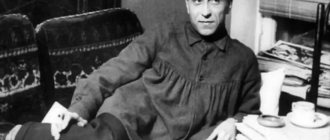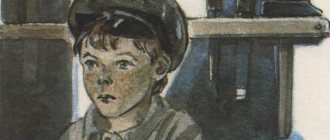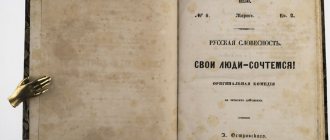One of the main poems of G. R. Derzhavin is his ode “Felitsa”. It is written in the form of an appeal from “a certain Murza” to the Kyrgyz-Kaisak princess Felitsa. The ode for the first time made contemporaries start talking about Derzhavin as a significant poet. The work was first published in 1789. In this poem, the reader has the opportunity to observe both praise and blame at the same time.
main character
In the analysis of the ode “Felitsa” it is imperative to indicate that it was dedicated to Empress Catherine II. The work is written in iambic tetrameter. The image of the ruler in the work is quite conventional and traditional, reminiscent in its spirit of a portrait in the style of classicism. But what is noteworthy is that Derzhavin wants to see in the empress not just a ruler, but also a living person:
“...And the food is the simplest
Happens at your table...”
"Simplicity" of the Empress
In the next ten poems, Derzhavin creates an ideal image of the heroine, describing her behavior and habits: love for walking, simple food, reading and writing, and a measured daily routine. Her contemporaries were no different from all this. There is no portrait description (referring to the ode “Felitsa”). Derzhavin, a brief summary of this shows, highlights the monarch’s democracy, unpretentiousness, and friendliness.
Novelty of the work
In his work, Derzhavin portrays the virtuous Felitsa in contrast to the lazy and pampered nobles. Also in the analysis of the ode “Felitsa” it is worth noting that the poem itself is imbued with novelty. After all, the image of the main character is somewhat different compared to, for example, the works of Lomonosov. Mikhail Vasilyevich’s image of Elizabeth is somewhat generalized. Derzhavin points in his ode to specific deeds of the ruler. He also speaks of her patronage of trade and industry: “She orders us to love trade and science.”
Before Derzhavin’s ode was written, the image of the empress was usually built in poetry according to its own strict laws. For example, Lomonosov portrayed the ruler as an earthly deity who stepped from distant heavens to earth, a storehouse of infinite wisdom and boundless mercy. But Derzhavin dares to move away from this tradition. It shows a multifaceted and full-blooded image of the ruler - a statesman and an outstanding personality.
Historical commentary: creation
It is impossible to start a conversation about the work without determining what Derzhavin himself lived at the time of its creation. “Felitsa” (a summary and even an analysis is the topic of this material) was written by Gavriil Romanovich in St. Petersburg in 1782. The genre of the traditional solemn ode in this case was destroyed by the poet: he decided to violate the law of three calms and in his creation combined book vocabulary with popular, colloquial vocabulary. In addition, satirical and laudatory were mixed in the space of one work, which also contradicted the established canons.
Personality in ode
And also in the analysis of the ode “Felitsa”, the student can note the fact that Derzhavin also introduced a personal element into the work. After all, the ode also contains the image of Murza, who is sometimes frank and sometimes sly. In the image of nobles, contemporaries could easily find those close to Catherine who were discussed. Derzhavin also meaningfully emphasizes: “That’s how I am, Felitsa, depraved! But the whole world looks like me.” Self-irony is quite rare in odes. And the description of Derzhavin’s artistic “I” is very revealing.
Means of expression
Derzhavin uses different means of artistic expression to develop images more deeply:
- metaphors (“to shed bliss”, “the path of meekness”, “thoughts in chimeras”);
- comparisons (“You can’t crush people like a wolf”, “Who is great in goodness, like God?”);
- epithets (“godlike queen”, “incomparable wisdom”, “radiant eye”, “righteous light”);
- rhetorical appeals (“Give it to me, Felitsa!”);
- rhetorical questions (“Where does virtue live? / Where does a rose without thorns grow?”);
- phraseological units (“captivate the spirit and mind”, “tame passions”);
- anaphora (“Where they give me a holiday, / Where the table glitters with silver and gold, / Where there are thousands of different dishes...”).
In addition, he uses the technique of antithesis, contrasting the image of the wise Felitsa with the depraved and lazy Murzas and the idle lyrical hero. Thanks to this, he seems to divide his work into two parts: in the first, he glorifies Felitsa, and in the second, he draws attention to existing problems. The juxtaposition highlights the contrast between what the Empress sees in her favorites and who they actually are.
Derzhavin's creative heritage still arouses research interest. It retains both its relevance and aesthetics. Many poets have returned and are returning to him, who highly value the poetic and stylistic features of the ode “To Felice.” Without a doubt, Derzhavin was able to erect a literary monument for himself that would not be broken by “neither a whirlwind, nor a storm, nor the flight of time.”
Author: Albina Ismailova
Who is Felitsa opposed to?
A student can discover many new facts in the process of analyzing the ode “Felitsa”. The poem was in many ways ahead of its time. Also, the description of the lazy nobleman anticipated the image of one of the main characters in Pushkin’s works - Eugene Onegin. For example, the reader can see that after waking up late, the courtier lazily indulges in smoking a pipe and dreams of glory. His day consists only of feasts and love pleasures, hunting and racing. The nobleman spends the evening walking on boats along the Neva, and in a warm house, family joys and peaceful reading await him, as always.
In addition to the lazy Murza, Catherine is also contrasted with her late husband, Peter III, which can also be indicated in the analysis of the ode “Felitsa”. Briefly, this point can be highlighted as follows: unlike her husband, she first of all thought about the good of the country. Despite the fact that the Empress was German, she wrote all her decrees and works in Russian. Catherine also defiantly walked around in a Russian sundress. In her attitude, she was strikingly different from her husband, who felt only contempt for everything domestic.
Notes
Notes from well-known incidents and genuine cases, containing the life of Gavrila Romanovich Derzhavin.
The author, who lists all his ranks, positions and orders at the beginning of his notes, but does not mention his poetic glory at all, was born in Kazan from noble parents in 1743 on July 3rd. His family descended from Murza Bagrim, who left the Golden Horde under Vasily the Dark. Derzhavin's parents, despite his father's colonel rank, lived in extreme poverty - only sixty souls on the estate. He was their firstborn, born frail, so they baked the baby into bread to get some vitality. One and a half years old, looking at a passing comet, the boy said his first word: God!
Continued after advertisement:
Despite poverty, the parents tried to give their son a decent education, but there were no good teachers in the provinces, and at the age of nineteen Derzhavin had to join the service as a simple soldier of the Preobrazhensky Life Guards Regiment. Then he began to write poetry; His comrades, having learned about this, began to ask him to write letters home. On the day when Catherine II carried out a coup and ascended the throne, Derzhavin and his regiment marched from St. Petersburg to Peterhof and saw the new empress in the Preobrazhensky Guards uniform, on a white horse, with a naked sword in her hand. The following years passed in various adventures - both love and the worst kind: Derzhavin was a cheater, knew both swindlers and brawlers. Forcibly he came to his senses and returned to the regiment in St. Petersburg. Soon after, in the tenth year of service, Derzhavin received the rank of officer and lived decently and happily.
Another year and a half later, Pugachev’s indignation began. Derzhavin went to General-Chief Bibikov, who had been appointed commander, and asked to join him as commander. He initially refused, but Derzhavin did not back down and finally achieved his goal. Throughout the campaign, he played a very important role, and was the first to send a report about the capture of Pugachev. But then the young officer accidentally became involved in the court struggle between the Panins and Potemkins. Field Marshal Panin was angry with Derzhavin, Potemkin did not help either. In 1777, after several years of ordeal, the officer, according to whose word the corps had recently moved, was dismissed into civilian service “due to inability to perform military service.”
Briefly exists thanks to advertising:
Derzhavin lived again in St. Petersburg, made good friends and, entering the house of Prosecutor General Vyazemsky, got a fairly prominent position in the Senate. Then he fell madly in love with the girl Katerina Yakovlevna Bastidonova, whom he married a year later and with whom he lived happily for eighteen years. In 1783, his ode “Felitsa” was published, from which the empress, in her own words, “cried like a fool” and gave Derzhavin a snuffbox studded with diamonds and full of gold ducats. After this favor, Vyazemsky began to find fault with him, and at the end of the year a serious clash occurred: Derzhavin caught the prosecutor general of concealing state revenues. The subordinate had to resign. Taking advantage of his freedom, Derzhavin went to Narva, rented a room there and, locking himself in, wrote the odes “God” and “Vision of Murza” in a few days.
A few months later he was appointed governor of Petrozavodsk. His superior was Governor-General Tutolmin; this man introduced his own laws beyond the state ones and forced people to report on forest planting in Karelia. Derzhavin could not tolerate such extravagance and arbitrariness; Soon the whole city was divided into two parties, and Derzhavin found himself in the minority. Denunciations of the most stupid and ridiculous kind were sent to the capital; In addition, the Governor General sent Derzhavin on a most dangerous journey through dense forests to the White Sea.
Continued after advertisement:
At sea, trying to get to the Solovetsky Islands, Derzhavin was caught in a severe storm and miraculously escaped. In the summer of 1785, the authorities decided to transfer him from Petrozavodsk to the same position in Tambov. There Derzhavin corrected a lot after his negligent predecessor, opened a public school, a printing house and balls with concerts. But soon clashes began with the governor-general, who was covering up rogue tax farmers. The matter became so complicated that Derzhavin himself was not only dismissed, but also put on trial.
He spent almost a year in extreme anxiety, not knowing how to get rid of the trouble, and finally wrote a letter to the empress, and she announced that she could not blame the author of “Felitsa.” Things were heading towards an honorable resignation, but it did not suit Derzhavin. In search of a new service, he became close to both favorites: the old one, Potemkin, and the new one, Platon Zubov (he even had to reconcile them in one dispute about estates), became friends with Suvorov, and wrote several poems noticed at court. Be that as it may, but with all these favors, Derzhavin wandered around the square, living in St. Petersburg without anything to do.
Briefly exists thanks to advertising:
So two years passed, when suddenly Catherine instructed him to consider one very important matter, and then, at the very end of 1791, she took him to be her secretary of state to monitor the decisions of the Senate.
Derzhavin expected a lot from this position, but the empress loved it when they reported to her about brilliant victories, and he had to read boring documents to her about unpleasant matters for weeks and months. Moreover, having seen the empress up close, with all her human weaknesses, Derzhavin could no longer devote inspired poems to her, and this was what was really needed from him. So, although he pleased the empress, he often became bored with his truth.
Three years later, Derzhavin was dismissed from the court to the Senate without any special awards. True, he could have become prosecutor general if he had asked for it, but he had a rule: not to ask for anything and not to refuse anything in the hope that when he was called upon for something, God himself would help him. In the Senate, many times Derzhavin happened to stand alone for the truth against everyone - sometimes winning, and sometimes losing. He was also the chairman of the commercial board, but in this position he had nothing but troubles. Finally, Derzhavin himself asked to resign, but did not receive it.
Advertising:
In July 1794, Katerina Yakovlevna died, and soon, in order not to succumb to debauchery out of melancholy, he wooed the sister-in-law of his friends Nikolai Lvov and Vasily Kapnist, Daria Alekseevna Dyakova. The groom was over fifty years old, and the bride about thirty; Even during his wife’s life, she admitted that she would not have wished for another groom. When Derzhavin proposed, Daria Alekseevna asked him for the consumable books, kept them for two weeks, and then only announced her consent. Over seventeen years of marriage, Derzhavin’s new wife doubled their fortune.
On November 6, 1796, Empress Catherine died suddenly, under whom, having begun his service as a soldier, Derzhavin reached famous ranks, was awarded by her, and most importantly, protected from all unjust persecutions. Immediately after the death of the empress, following the new emperor, armed people burst into the palace with great noise, as if into a conquered city. Soon the Commerce Collegium was reorganized, and Derzhavin received an order to appear at the palace and received an oral command from Emperor Paul to be the ruler of the State Council - a position of unprecedented importance. A few days later, a decree was issued appointing Derzhavin as ruler not of the Council, but only of the Council’s office (that is, a simple secretary), and, moreover, without proper instructions. Derzhavin came to the sovereign to clarify this misunderstanding; he said with great anger: “Go back to the Senate and sit still!” Then Derzhavin, in front of a large crowd of people, said: “Wait, this tsar will be of some use!” There were no big troubles. Moreover, Derzhavin was entrusted with an important investigation in Belarus, after which he was again made president of the commercial board, and then state treasurer. But Pavel didn’t let him see him anymore, saying: “He’s hot, and so am I, then we’ll quarrel again.”
Derzhavin had to audit all state accounts, which were found in great disarray. He was supposed to report his report to the emperor on March 12, and on the night of that day Paul died. How things would have ended if he had remained alive is unknown; perhaps Derzhavin would have suffered. Many times during the reign of Paul he showed independence and courage, and at that time he made an inscription on his coat of arms: “I hold on by the power of the Highest.”
Advertising:
Under Alexander I, Derzhavin received a new post: he became the first Minister of Justice and at the same time the Prosecutor General of the Senate. He put a lot of effort into the fight against the young friends of the emperor, who seduced him with projects for a constitution and hasty liberation of the peasants: Derzhavin even tried to protest against Alexander’s favorite decree on free cultivators. Soon, criticism began against him, and in October 1803 it came to a collision. When Derzhavin asked what he served in, the sovereign only answered: “You serve too zealously.” “But how can it be, sir,” answered Derzhavin, “then I cannot serve any other way.” On the next or third day after this, a decree of resignation was issued. On October 8, 1803, Derzhavin left the service forever and devoted his leisure time to various literary pursuits. The notes were brought up to 1812.
Images in ode
It should be noted that the image of Prince Chlorus also runs through the entire poem. This character is taken from The Tale of Prince Chlorus, which was written by the Empress herself. The ode begins with a retelling of this fairy tale; there are such images as Felitsa, Lazy, Murza, Chlorine, Rose without thorns. And the work ends, as it should be, with praise to the noble and merciful ruler. Just as happens in mythical works, the images in the ode are conventional and allegorical. But Gavrila Romanovich presents them in a completely new manner. The poet portrays the empress not just as a goddess, but also as one who is not alien to human life.
Catherine II's reaction
What could the still little-known poet Derzhavin count on next? “Felitsa,” a brief summary of which will soon be described, attracted the attention of the President of the Russian Academy E. Dashkova, and in 1783 the creation was anonymously published in one of the spring issues of the magazine “Interlocutor of Lovers of the Russian Word.” Dashkova presented the poem to the empress herself; Catherine was moved to tears and became very interested in the author of the work. As a result, Derzhavin received from the empress an envelope with 500 gold rubles and a gold snuff box studded with diamonds. Soon Gabriel Romanovich was presented to the court and favored by the queen. Thus, it was after the creation of this ode that Derzhavin gained literary fame. “Felitsa,” a brief summary of which will answer your questions, is an innovative work. It was qualitatively different in thought and form from everything that existed before.
Who was the author of the ode making fun of?
Those who need to make a detailed analysis of the ode “Felitsa” can describe those nobles whom Derzhavin ridiculed in his work. For example, this is Grigory Potemkin, who, despite his generosity, was distinguished by his capriciousness and whimsicality. The ode also ridicules the ruler’s favorites Alexei and Grigory Orlov, revelers and horse racing enthusiasts.
Count Orlov was a winner of fist fights, a ladies' man, a gambling hunter, as well as the killer of Peter III and the favorite of his wife. This is how he remained in the memory of his contemporaries, and this is how he was described in Derzhavin’s work:
“...Or, taking care of all matters
I leave and go hunting
And I’m amused by the barking of dogs...”
We can also mention Semyon Naryshkin, who was the huntsman at Catherine’s court and was distinguished by his exorbitant love of music. And Gavrila Romanovich also puts himself in this row. He did not deny his involvement in this circle; on the contrary, he emphasized that he also belonged to the circle of the chosen ones.
Satirical criticism of the past
However, Derzhavin is not always good-natured. “Felitsa,” a brief description of the main idea of which was presented in this article, also shows the reader another line - this is a description of the period of Anna Ioannovna’s reign. Here the poet does not hide his own indignation at the case of the forced marriage of the high-born prince M. Golitsyn, at the whim of the queen, to an old ugly dwarf, because of which a worthy man turned into a court jester (stanza 18). According to Derzhavin, other representatives of noble Russian families were also humiliated - Count A. Apraksin and Prince N. Volkonsky. Oda G.R. Derzhavin's "Felitsa", a brief summary of which allows us to evaluate its large-scale idea, among other things, affirms the inviolability of the human right to preserve personal dignity and honor. The trampling of these categories is considered by Gabriel Romanovich as a great sin, and therefore he calls on both the reader and the empress to respect them. To do this, Catherine needs to comply with the laws, be the guarantor of their supremacy, protect the “weak” and “poor”, and show mercy.
Final lines
Finally, the artistic originality of G. R. Derzhavin’s ode “Felitsa”, a brief summary of which was presented in detail in the sections above, is also manifested in the final stanzas of the work. Here the exaltation of the empress and her reign rises to a new limit - the author asks the “great prophet” and the “heavenly powers” to bless Catherine and save her from illness and evil.
Although the end again returns the reader to the mainstream of classicism and the canonical ode, yet, taken together with the rest of the content, it seems to carry a new, rethought meaning. The praise here is not a simple tribute to the direction, traditions and conventions, but a real impulse from the soul of the author, who at that time still sincerely believed in the image of Catherine he created. The famous critic Belinsky called this work “one of the best creations” of Russian poetry of the 18th century.








